Blocked drains Canberra

Are you dealing with a blocked drain in Canberra? Look no further than Blueline Plumbing & Gas for all your drain unblocking needs.
Request a quote
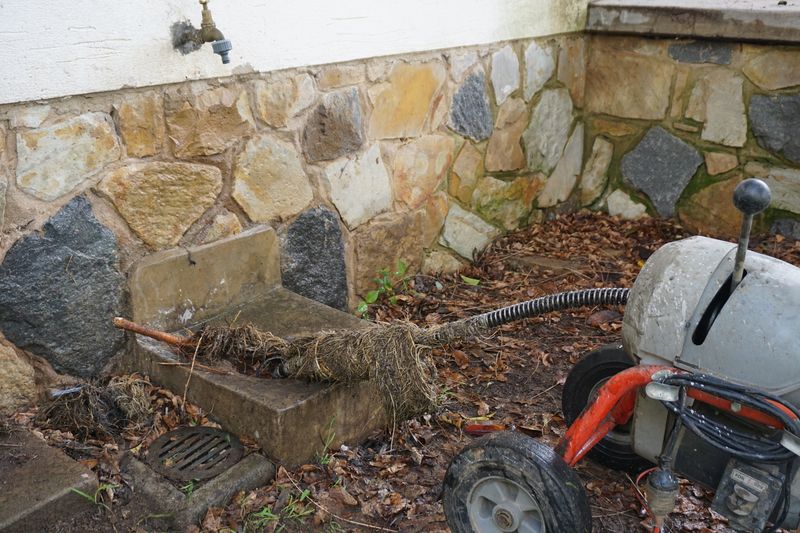
Drain services
We offer comprehensive drain services that cover everything from clearing blocked drains, sewers, and stormwater systems to resolving problems with sinks, showers, and toilets. Experience comprehensive drain camera inspections, effective stormwater drainage solutions, efficient charged stormwater systems, reliable suspended drainage, and precise backflow testing, all designed to ensure your peace of mind.
The best blocked drain plumbers
Prompt and reliable blocked drain plumbers
As the leading blocked drain plumbers in Canberra, we take pride in our expertise, rapid response times, and steadfast commitment to ensuring customer satisfaction. At Blueline Plumbing & Gas, we recognise the disruption and possible water damage that a clogged drain can cause. We are dedicated to delivering fast and effective service, getting your drains flowing perfectly again in no time. Our expert plumbers arrive with cutting-edge tools, prepared to handle even the most challenging drain blockages with ease. Our top priority is to guarantee customer satisfaction. We are committed to providing outstanding craftsmanship alongside unparalleled customer service. Our approachable team is committed to upholding our status as the top blocked drain plumbers in Canberra.
What is included in our blocked drain service
Comprehensive blocked drain solutions
Blueline Plumbing & Gas expertly tackles blocked drains with unmatched professionalism. Unfortunately, we know that a clogged drain can be annoying and even harmful. Our full service will clear out your clogged drains in Canberra quickly and completely. We come right away because we know that a clogged drain is a big problem that makes life difficult. Our cutting-edge equipment is designed to handle even the most challenging blockages with ease. Our expert drain plumbers are equipped to precisely identify issues and deliver efficient solutions. Experience comprehensive drain cleaning and prompt drain repairs with us.
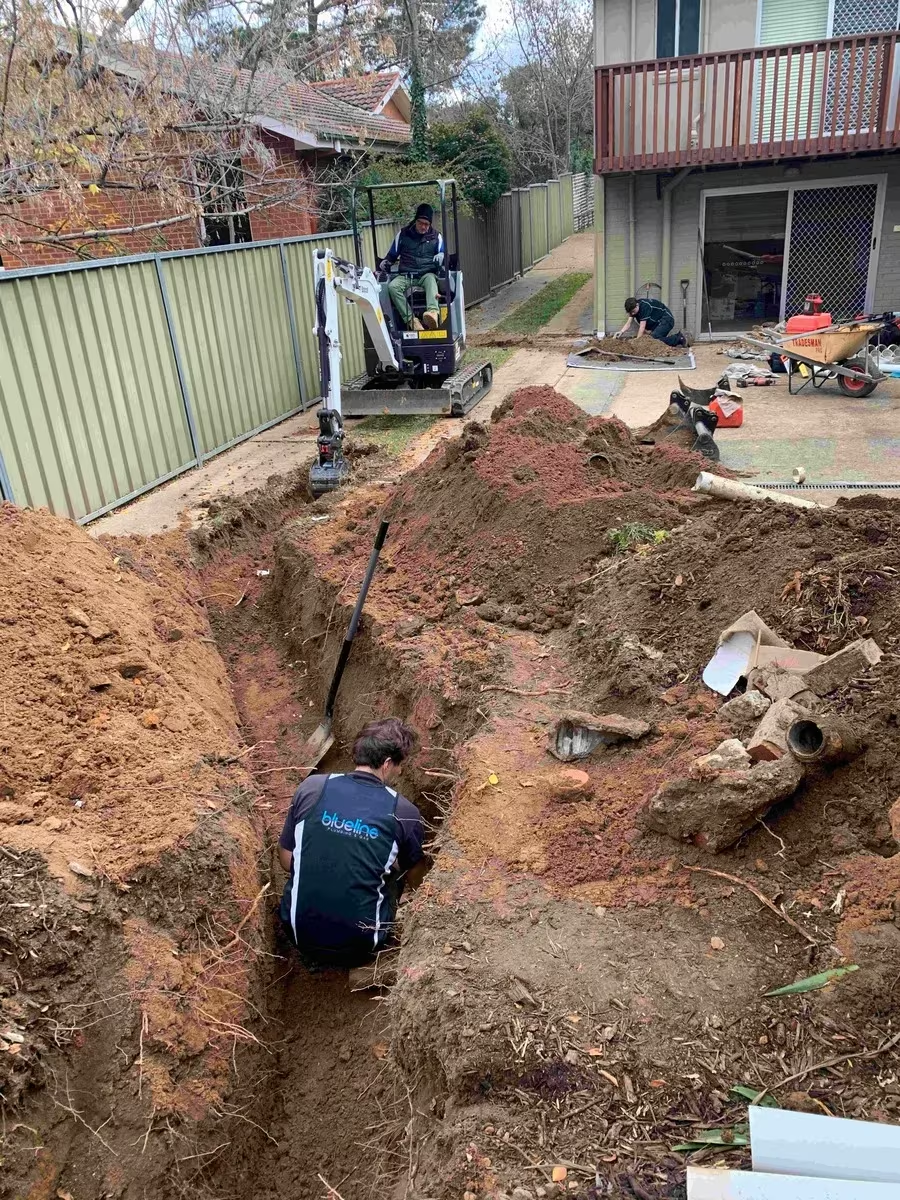
Blueline Plumbing & Gas are your local specialist for all domestic plumbing and gas fitting needs.
Get in touch for a quote or speak with a qualified plumbing specialist. You can count on us to find the best solution if you need plumbing or repair help right away.
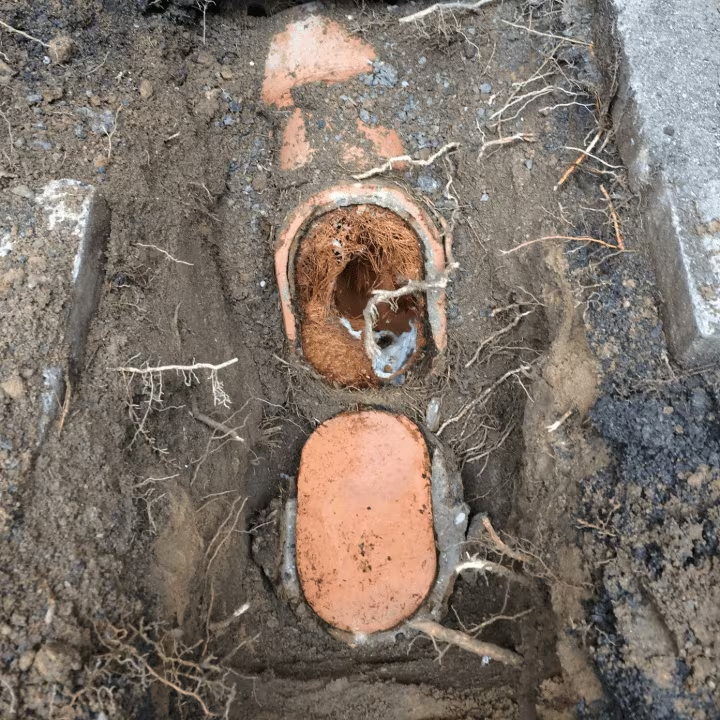
A thorough and detailed blocked drain inspection
At Blueline Plumbing & Gas, we know how important it is to thoroughly inspect blocked drains to find the root cause. Our experts use specialised equipment and follow a detailed process for inspections in Canberra. Our state-of-the-art cameras meticulously examine the drainage system, pinpointing any blockages or damage with precision. We conduct thorough tests to assess the flow and functionality of the drain. High-pressure water jetting effectively removes blockages and guarantees optimal flow. This enables us to pinpoint the exact reason for the blockage, whether it's tree roots or foreign objects. We aim to swiftly address the problem and ensure future blockages are avoided. At Blueline Plumbing & Gas, we are committed to delivering dependable and top-notch services for blocked drains.
Tailored solutions to unblock your drain
At Blueline Plumbing & Gas, we recognise that blocked drains can lead to significant frustration and disruption. Experience customised solutions for unblocking drains in Canberra, delivering swift and effective results to your drainage issues. Our skilled plumbing experts utilise cutting-edge equipment and innovative techniques to effectively resolve any drain blockage. Our high-pressure water jetting service effectively clears obstructions, ensuring a smooth and efficient flow is restored. This technique effectively tackles stubborn blockages resulting from tree roots or significant accumulation. We utilise drain snaking to effectively break apart and eliminate smaller clogs. Furthermore, we utilise advanced cameras and pipe locators to precisely identify the cause and location of any blockage. Regardless of how severe or complex your drain blockage may be, our skilled team is equipped with the expertise, tools, and customised solutions to restore your drains to optimal flow.
What are the benefits of hiring a professional to unblock your drain?
Trying to fix a blocked drain yourself can cause more damage and expensive repairs. Hiring drain specialists has benefits. We have the professional expertise to identify the cause and find the right solution. Our arsenal includes specialised equipment such as high-pressure water jetting machines, drain cameras, and pipe locators. This enables us to precisely identify and address the issue at hand. Engaging experts safeguards your drainage system from additional harm. Attempting DIY methods may result in broken pipes and water leaks. Blueline Plumbing & Gas implements measures to safeguard your plumbing system. In summary, enlisting the expertise of a professional drainage specialist such as Blueline Plumbing & Gas in Canberra offers significant advantages. We specialise in pinpointing and eliminating drain blockages, safeguarding your property from additional damage and expensive repairs.
The electric eel drain unblocker
Blocked drains can be inconvenient for residential and commercial properties in Canberra. Blueline Plumbing & Gas provides expert drain unblocking services designed to swiftly and efficiently eliminate any blockages. The Electric Eel Drain Unblocker is your go-to solution for conquering tough clogs. A long metallic cable links seamlessly to the main plumbing line, featuring an auger or an uncoiled spring at its end for optimal performance. Our skilled plumbers expertly manoeuvre the Electric Eel Drain Unblocker into the troubled pipe, effectively breaking down and dislodging stubborn blockages such as tree roots or waste accumulation. This tool is incredibly efficient, enabling us to restore water flow and avert additional damage and unpleasant odours. At Blueline Plumbing & Gas, we are committed to delivering exceptional drain unblocking services in Canberra, utilising cutting-edge equipment and expert techniques to ensure swift and effective solutions. Count on us for transparent pricing, swift responses, and exceptional service. Get in touch with us today for all your plumbing and gas requirements.
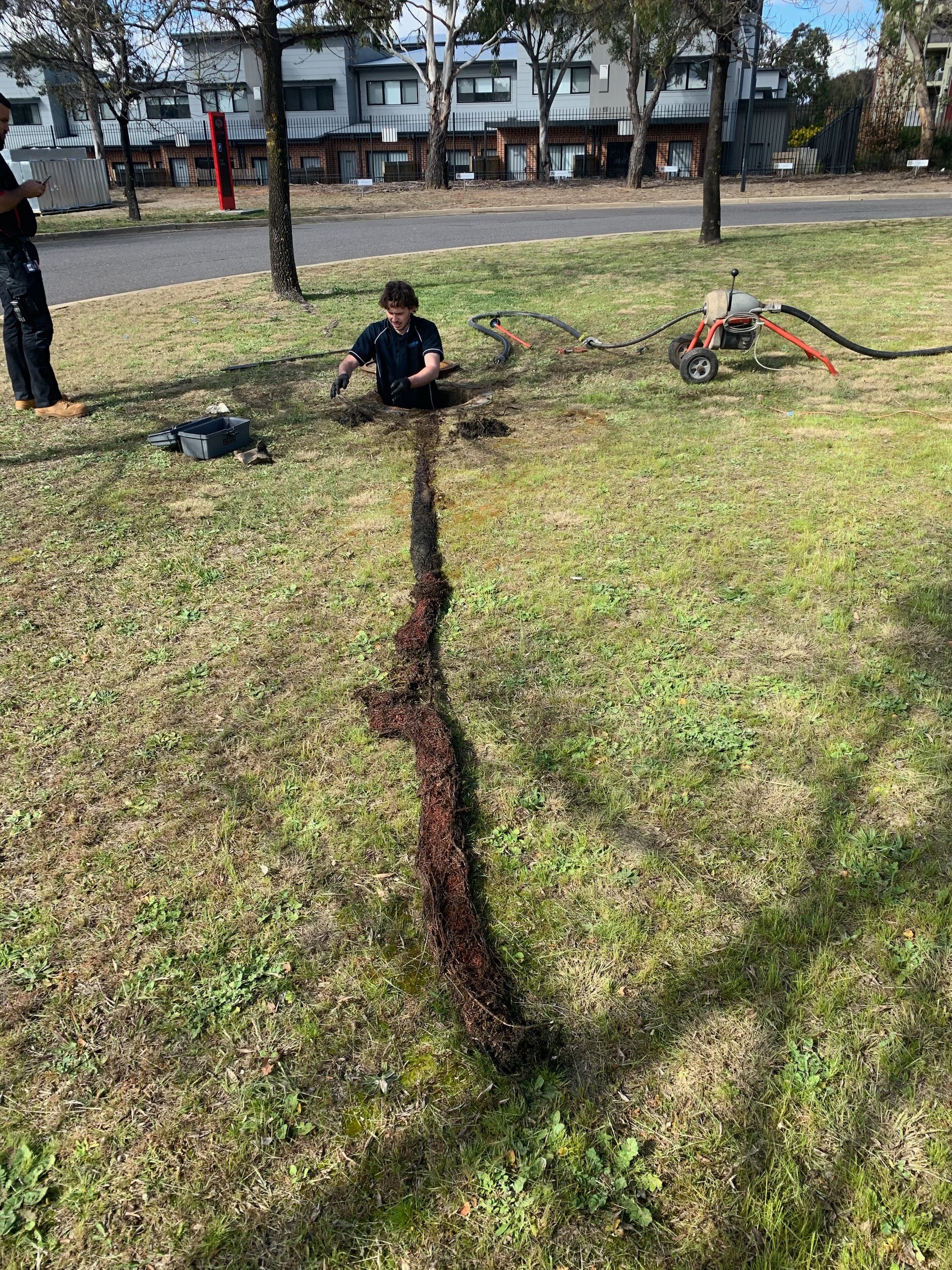
Drain camera inspections Canberra
Blocked shower drains Canberra
Stormwater drainage Canberra
Blocked stormwater drains Canberra
Blocked sink drains Canberra
Blocked drain Canberra
Drain services Canberra
Blocked sewer Canberra
Blocked sewers Canberra
Blocked drain plumber canberra
Canberra blocked drain
Drain cleaning Canberra
Drain plumber Canberra
Drain specialist Canberra
Drain repair Canberra
Canberra blocked drain plumber ACT
Canberra blocked drain services
Plumber blocked drain Canberra
Drain clear Canberra
Drain plumbers Canberra
Unblock drain Canberra
Canberra drain cleaning
Drain repairs Canberra
Blocked drain
Blocked drains
Drain plumber
Drain repairs
Drain repair
Blocked shower drains
Blocked sink drains
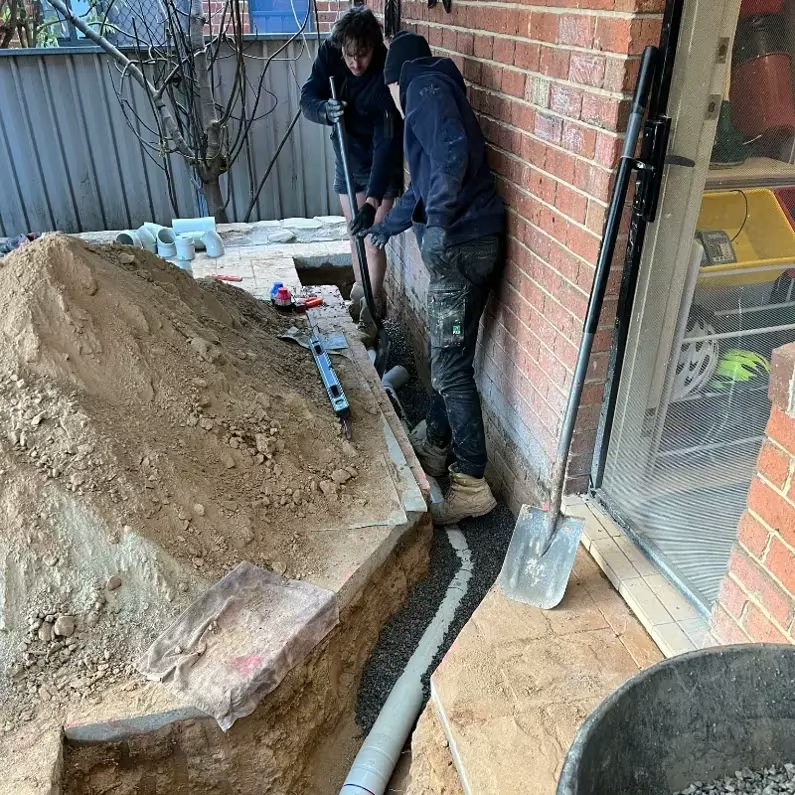
Drain camera inspections
Experience unparalleled drain camera inspections with Blueline Plumbing & Gas, your premier choice for outstanding drain services in Canberra. We employ a compact camera to perform a thorough visual inspection of the pipes inside the drain. This enables us to identify any blockages, damage, or other factors that could be causing drainage problems. Our drain camera inspections allow us to accurately identify and diagnose the underlying problems in your drainage system. Our skilled technicians manage the equipment with precision, guaranteeing optimal operation while recording real-time footage for thorough analysis. This enables us to pinpoint the most efficient method for repairing or clearing the drain. Experience thorough drain camera inspections that meticulously examine every detail, ensuring effective solutions for all your drain issues.
Blocked sewer repair
Blueline Plumbing & Gas understands the inconvenience and frustration of a blocked sewer. Our expert team is equipped to handle any sewer plumbing problem that Canberra has to throw at us. We use a comprehensive and systematic method to diagnose and resolve the issue. We start with a drain camera inspection to visually assess the sewer's condition and locate any blockages or damages. Once identified, we use powerful water jetting techniques to clear the blockage. Our skilled technicians operate the equipment with precision for effective results. Blocked sewers can be caused by various factors, such as tree root intrusion, water pipe damage, or debris buildup. At Blueline Plumbing & Gas, we have the expertise to address these issues. We use tailored repair methods to provide prompt and professional service.
Blocked stormwater drain repair
Blueline Plumbing & Gas specialises in repairing blocked stormwater drains in Canberra. We understand the inconvenience and potential damage caused by these blockages. Our team uses specialist equipment and techniques to efficiently remove blockages. Debris, tree roots, and pipe damage can all contribute to blockages. We use drain camera inspection to accurately identify the cause and location of the blockage. This allows us to offer targeted repairs and minimise disruption. Taking prompt action is crucial in preventing further water damage. We respond quickly to resolve blocked stormwater drains. Trust Blueline Plumbing & Gas for reliable and timely service in Canberra.
Backflow testing
At Blueline Plumbing & Gas, backflow testing is crucial for maintaining water quality and preventing health risks. Backflow happens when contaminated water enters the clean water supply due to changes in water pressure or faulty valves. This can introduce harmful substances into the drinking water supply. To ensure water quality, we follow a systematic process for backflow testing. First, we isolate the testing area. Then, we attach a specialised test kit to the backflow prevention device to measure water pressure and check for backflow. During testing, we monitor water flow and take accurate readings. Our skilled technicians use equipment like gauges, valves, and test cocks for inspections. At Blueline Plumbing & Gas, we prioritise customer safety and health. Our comprehensive backflow testing ensures that your plumbing system meets high standards of water quality and safety.
Contact us
Our team is ready to assist you!
19 Battye St, Bruce ACT 2617, Australia


-p-500.webp)



